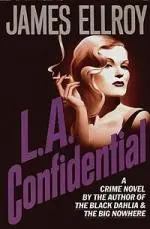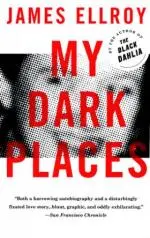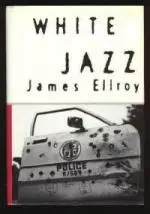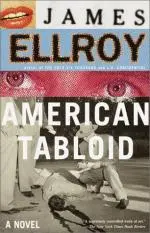…every interview I give is a chance to puncture the myth I've created about my work and refine it.
Gather around you commies, pervs, pederasts, peepers, weenie waggers, dimebag dirtballs, junkies and used car salesmen. Gather around and let me tell you about Lee Earle Ellroy, AKA the demon dog of American literature, the foul owl with the death growl, the white knight of the far right, the slick trick with the donkey dick, AKA James Ellroy, the king dick wannabe commie/hippie/left wing basher ala Mickey Spillane, AKA the sensitive soul full of heartbreak and loneliness pining for his murdered mother and desperately trying to fill the hole her death caused with half a dozen incarnations of her.
As you can probably guess, James Ellroy is a man of carefully calculated myth. He is an enigma, a stranger, the guy you purposely cross the street to avoid because you get the impression he's either going to bum a twenty spot off of you and then chew your ear off, or crack you across the face with a leather sap and steal the twenty spot instead.
He may be one or all of these things, but chances are the general reading public will never know, because first and foremost, Ellroy is a myth maker, a rare beast in American letters. He is unabashedly a writer in the same vein as Hemingway and Fitzgerald, as Bukowski, (and yes, Ellroy would be sickened by that comparison), as James Crumley. He's a man strictly defined by his art, by the characters he's created, and by the pain and suffering caused by his personal demons.
But I'm not here to dispel the myth of James Ellroy. I'm here to point you in the direction of a few of his key works. But you can't help but throw in a few nuggets of the official myth along the way in hopes that you may be able to unravel the illusion that is the Demon Dog.
The truth of the matter is, you lose a parent to murder when you're 10 years old, and in fact at the time of the murder you hate your lost parent, my mother in my case.
Let's hop into the way back machine and head to March of 1948, when a nurse named Geneva Odelia (née Hilliker) Ellroy popped out little Lee Earle. Lee Earle's poppa, Armand "Lee" (yeah, you had to know that god awful name came from somewhere) Ellroy. Good old Lee Senior was an Accountant by trade, but his real passion was in laying the pipe to any woman who was willing to spread her legs for him. Lee Senior preferred starlets (supposedly Poppa Lee was the business manager and sometimes lascivious lapdog of Rita Hayworth), so you know that divorce was in the cards for Momma and Poppa Ellroy.
After the divorce, little Lee and his mom moved to the dirtbag farming town of El Monte, California, and little Lee was shuttled back and forth between Lee Senior's bachelor digs in Hollywood. Geneva was a hardworking woman who was rumored to have a bit of a drinking problem, and a strong attraction to middle-aged, quasi bad-boys. Little Lee was spending the weekend with his father when Geneva went out with one of her bad-boys and never came back. She was found by two little leaguers, beaten and strangled, on 06/22/1958. Ellroy was ten-years-old, and this was the beginning of his downward spiral and his career as a crime novelist.
Lee Senior wasn't much for parenting, and Ellroy spent the bulk of his teens carousing L.A. neighborhoods, playing Nazi to infuriate and sicken his peers and teachers, and peeping the bedrooms of his female classmates and their mothers. Ellroy was far more interested in the mothers than the daughters. Ellroy's love/hate relationship with Geneva Ellroy was taking shape. Ellroy dropped out of high school and graduated to petty larceny. He kept up with the peeping but added breaking and entry to the mix, along with shop lifting, homelessness, and an addiction to pyrimidine mist inhalers. For those of you not in the know, pyrimidine is an over the counter asthma inhaler whose primary ingredient is liquid ephedrine soaked wads of cotton; if you've watched at least one season of Breaking Bad, you'll know that ephedrine is the primary ingredient in meth. Ellroy spent his days squatting on L. A. rooftops, devouring wads of ephedrine soaked cottonballs and reading crime novels.
Ellroy began to turn things around in his thirties when he took a job as a golf caddy and wrote his first novel, Brown's Requiem. Requiem and his subsequent seven novels had the distinct feel of Chandler mixed with Spilane. Hard men with strong rebellious streaks who were outsiders. While the novels were solid reads, they lacked anything to set them apart from the other hardman novels being written by such crime luminaries as Lawrence Block and Robert Parker. This all changed with the publication of his ode to the most infamous unsolved murder in Los Angeles history and what would become the first novel of the L.A. Quartet, The Black Dahlia. While I consider The Black Dahlia to be a lesser novel in Ellroy's oeuvre, it was essential to the creation of Ellroy's hallmark style. But it also served as a catalyst to Ellroy confronting his love/hate relationship with his mother, and the writing of his groundbreaking memoir, My Dark Places.
I want to see these bad, bad, bad, bad men come to grips with their humanity.
Alrighty, kiddos, let's jump into the books you Luddites should get your hands on if you plan to start delving into the literary crack that is James Ellroy.
![]() L.A. Confidential
L.A. Confidential
There will be more than a few folks who are going to have a problem with me bypassing the first two books in the L.A. Quartet, The Black Dahlia and The Big Nowhere. But, as I stated earlier, Dahlia, while essential to Ellroy’s growth as a novelist, can be a bit of a drag for first time readers; and The Big Nowhere is a serial killer novel and is the odd man out in the series arc. But with L.A. Confidential, Ellroy finds his true voice and begins to set the tone for subsequent novels.
Like so many Ellroy novels, L.A. Confidential largely focuses on the widespread corruption which (at least in Ellroy’s world), Los Angeles was founded on. But what is most significant is what I refer to as the three aspects of Ellroy’s public persona, AKA Bud White, Ed Exley, and Jack Vicennes. White is the brutal hardman whose past has so badly damaged him that he has the flat out need to physically destroy everything in his path, to sabotage every relationship; Ed Exley is fussy, fastidious, someone willing to sacrifice everything in order to advance, but someone whose stalwart moral sensibilities put him at odds with everyone who surrounds him; Jack Vicennes is the consummate insider. Smooth, handsome, confident, and ultimately doomed. These three distinct voices also serve as character templates for Ellroy’s greatest achievement as a storyteller, The Underworld U.S.A trilogy.
![]() My Dark Places
My Dark Places
Some would call this Ellroy’s masterwork. The record of the re-openned investigation into his mother’s death is highly personal, and at times makes for an uncomfortable reading experience because of Ellroy’s painful admissions of the long held hate for his mother. Ellroy comes at the investigation with the keen eye of a journalist, but he can never fully remove himself from the events leading up to his mother’s death, or the ripples of self-destruction which it caused. My Dark Places is a brilliant glimpse into the author and one of the most innovative pieces of autobiography written in the 20th century, and even if you don’t pursue the other books I’ve listed here, I strongly recommend you read this jarring work.
![]() White Jazz
White Jazz
I typically refer to the final book in the L.A. Quartet as the gateway novel to Ellroy’s work because of three reasons:
- 1) Its overall length is far less intimidating to most readers.
- 2) It gave birth to Ellroy’s current narrative style, which he recently referred to in an interview with the Economist as “scandal language”.
- 3) It is easily Ellroy’s most violent novel, albeit one of his most accessible.
White Jazz focuses on Dave Klein, slumlord, bagman, pimp, enforcer, L.A.P.D detective and the man set to take the fall in a federal investigation into corruption within the L.A.P.D. As I stated earlier, White Jazz was the first appearance of the short, declarative sentences which mimic tabloid headlines that are “scandal language”. Ellroy’s current style can be at times maddening to read for the uninitiated, but once you find a rhythm, chances are you’ll find yourself jonesing for more.
![]() The Underworld U.S.A trilogy
The Underworld U.S.A trilogy
Holy paranoia, Batman! Ellroy is nuts! Flat out bonkers! And yet, he might possibly be right with the cavalcade of 20th century conspiracies covered in American Tabloid, The Cold Six Thousand, and Blood’s A Rover. Have you ever wondered who killed JFK? MLK? Bobby Kennedy? Well, Ellroy’s got the answers for you! He also delves deep into the Bay of Pigs, the F.B.I’s war on the Civil Rights movement, Howard Hughes’ need for “pure” Mormon blood, and whether or not J. “Gay” Edgar Hoover dressed up as his mother on the weekends. Ellroy writes about it all and then some and does it all with feverish glee. What also marks these books as being unique to the Ellroy oeuvre is that you need to read the three books in order, whereas with the L.A. Quartet or his earlier Llyod Hopkins Trilogy (Blood on the Moon, Because the Night, and Suicide Hill), you can skip from book-to-book and not feel the need to back track. But once you start in on American Tabloid, you’ll want the lunacy to continue.
I put on such a good show, the story is outrageous, and people don't want to hear that I'm basically a reasonable human being. As long as it continues to get me print, I'll continue to perform in an exuberant manner.
And the show goes on for Ellroy. It goes on in the form of films such as Street Kings and Rampart; in the ill-fated, slightly embarrassing TV show, L.A. City of Demons; in his second volume of memoir, The Hilliker Curse and his first foray into the world of ePublishing, Shakedown. I think why I admire Ellroy so fiercely, why I defend his work and antics is because of one thing: Ellroy is an American original. Love him or hate him, worship or despise, you have to admit that no one in American letters is doing quite what he is: creating myth. And like all good myths, constantly warping it into something new.

About the author
Keith Rawson is a little-known pulp writer whose short fiction, poetry, essays, reviews, and interviews have been widely published both online and in print. He is the author of the short story collection The Chaos We Know (SnubNose Press)and Co-Editor of the anthology Crime Factory: The First Shift. He lives in Southern Arizona with his wife and daughter.
 L.A. Confidential
L.A. Confidential
 My Dark Places
My Dark Places
 White Jazz
White Jazz
 The Underworld U.S.A trilogy
The Underworld U.S.A trilogy








